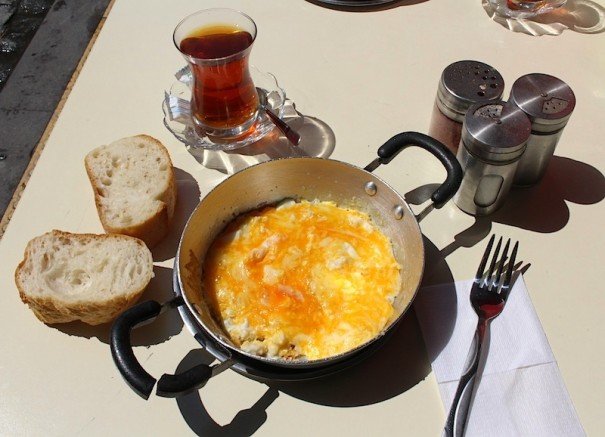
The Egg Man in Istanbul

The Egg Man in Istanbul
We refer to it as the ‘Egg Man’ in our house, but the nondescript lokanta down the street from us in Ortaköy, a picturesque neighborhood on the Bosphorus in Istanbul, really isn’t known for their eggs. The times we’ve been there, the other patrons have mainly been old men “drinking” their morning soup, or so it’s described in Turkish. In fact, Ortaköy offers a number of more conventional options for breakfast: there are the trendy, if overpriced, restaurants on the waterfront that offer a pork-free eggs benedict and other attempts at international breakfast fare; the börek salonları, with their long, flat electric griddles keeping the coiled börek and buttery pastries as warm as possible; and a few cafes that serve the full-on Turkish breakfast, complete with tiny plates of cucumbers, tomatoes, cheese, honey and cream.
But the Egg Man — while not a man, exactly, the lokanta is mainly kept afloat by the bespectacled waiter-cum-manager who calls orders, runs to and fro in his white coat, and serves food effortlessly with arms that are surprisingly smooth and hairless — is remarkable because it is so utilitarian. It’s like those objects that you cherish but are reluctant to bring out when guests are visiting: the wide-mouthed, burnt yellow bowls that hold just the right amount of soup, or the dimpled, purple plastic water jug that fits perfectly in the refrigerator door. In the same way, the Egg Man provides the basic building blocks of routine — grease, eggs, cheese — that speak more to private consumption than public outing.
The quotidian aspect of the Egg Man’s greasy, cheesy eggs is what first drew me in. I ate them almost every morning in July 2012, the month that I moved with my boyfriend to Ortaköy. We had arrived to a completely bare apartment — there weren’t even light fixtures — and began a month-long attempt to cobble together enough furniture and appliances to fulfill basic human needs. In the meantime, we had no way to store food, let alone prepare meals, and our mornings began with a walk down to the Egg Man. I would order sahanda kaşarlı beyaz peynirli yumurta, two eggs cooked in a shallow frying pan with a hard yellow cheese (kaşar) that goes stringy when fried and a tangy white cheese (beyaz peynir) that teeters on the edge of overpowering the dish. After a dusting of red pepper flakes, which would bleed slightly in the hot grease that covered the bottom of the pan, I would dig in with a fork in my right hand and a large chunk of fresh white bread in my left. Always a fast eater, the eggs would quickly morph into a weight in my stomach, a heaviness that dulled any anxiety about the empty apartment — the first I would share with my boyfriend — in a new city.
We survived the month and came out of it with a used refrigerator and stovetop. My boyfriend became my husband, and we’re settled in our apartment that now holds too many chipped bowls and a drawer full of mismatched silverware. We still go to the Egg Man, mostly to quell the disquiet that comes after a night of drinking. Despite bringing numerous friends and family to the lokanta, few seem to take to the heavy fare. It’s probably better that way: we can mop up the rich mixture of yolk and grease in peace, just as we would at home.